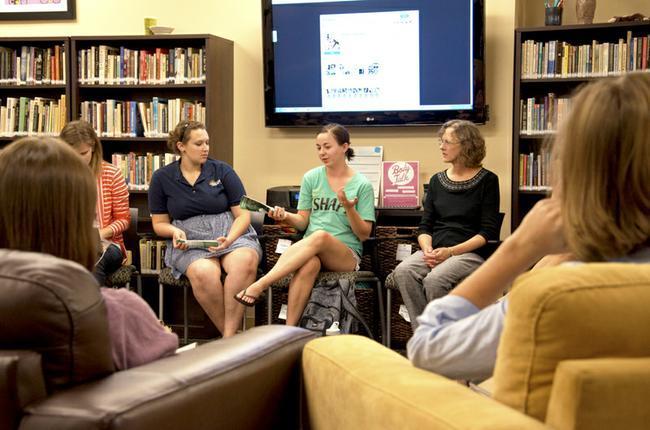On Wednesday, the MU Women’s Center hosted Body Talk, part of the center’s Ms. Zou Series. Four panelists answered students’ questions about sexual health.
The panel included Sexual Health Advocate Peer Education President Hannah Keel, curriculum coordinator Heather Eastman-Mueller, member Megan Voss and primary care provider Julaine Stiers, a representative from the Student Health Center.
Each member of the panel then drew on her experiences to answer anonymous questions about topics ranging from birth control to sexually transmitted infections to the cost of regular examinations and tests.
“We are definitely the people to ask these questions to,” Keel said. “We probably dispelled a few myths tonight. People hear all kinds of crazy things on the Internet and from their friends. Here we can sit them down and tell them why that’s wrong.”
The Body Talk attendees wrote down questions anonymously and placed them in a turquoise bucket to be passed up to the panel. The panel then answered the questions, addressing the whole group.
Women’s Center worker and junior Melissa Wasicko said she appreciated this format of discussion.
“It’s nice because I can ask questions in an anonymous setting and not feel stupid about it,” she said. “And some of the questions would have never occurred to me to ask.”
The panel focused on the importance of communication with sexual partners as well as doctors and physicians.
“Open communication that’s honest is the first step in being a sexually healthy individual,” Eastman-Mueller said. “Women need to self-advocate. You need to advocate for yourself and your body because nobody else will. Look at things with a critical lens and ask questions.”
According to Women’s Center coordinator Suzy Day, the idea for Body Talk came from the number of women who asked questions when visiting the center.
The format of the event and the background of the panel members created a forum in which frequently asked questions and resources could be available in one place.
“A lot of times women don’t get sex education in schools,” Wasicko said. “It’s all kind of hush-hush. It’s important to be healthy and know about your body.”
Keel said the Body Talk discussion could encourage preventative measures so women can learn about avoiding pregnancy and protecting themselves from different types of STIs.
“I feel really passionate about public health,” she said. “Preventative health is key. It doesn’t even have to be about sexual health. Preventative education is important. Then we won’t see problems later on.”
Each member of the panel stressed the importance of women feeling comfortable with their bodies and taking pride in their sexuality and sexual health.
“Society shames us into thinking our bodies are bad,” Eastman-Mueller said. “The language associated with it shames us. We should say, ‘I have a vagina and I’m proud of it,’ rather than referring to it as ‘down there.’ That kind of language trivializes our bodies. We need to take a stand and demand that respect from other people.”








